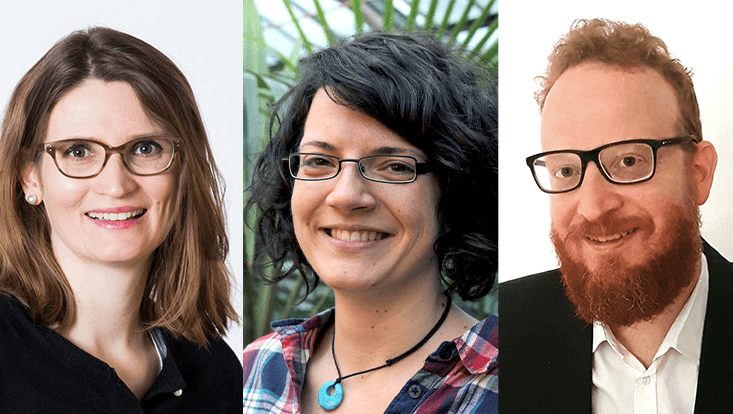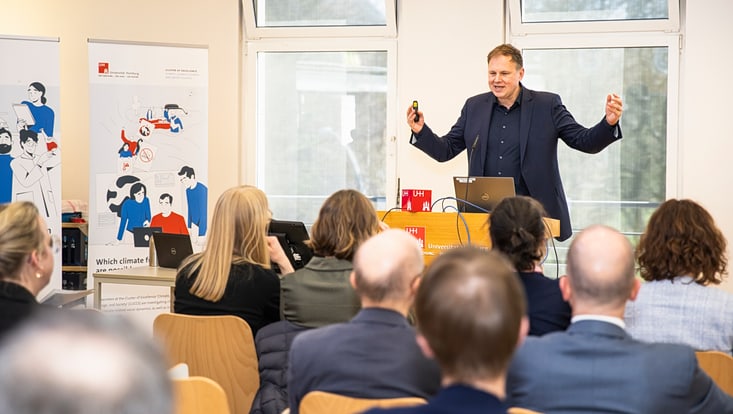Ideas and Venture FundNew research on Aristotle, food plants, and human behavior when making prognoses
4 August 2020, by Christina Krätzig

Photo: UHH/privat
Twenty Universität Hamburg researchers have been receiving money from the newly established Idea and Venture Fund as part of the Excellence Strategy of the Federal and State Governments. The researchers should use the 1-year funding period to prepare a large externally funded project. We are introducing 3 projects.
Prof. Dr. Petra Steinorth, business economist and professor of risk management and insurance: How do genes affect economic prognoses?
How we judge the development of the stock market or the course of an illness varies from person to person. But why? Are the assessments a consequence of someone’s prior knowledge and experience? Or is the way we evaluate risk innate—that is, do we have a genetic disposition? To find this out, Prof. Dr. Petra Steinorth will ask at least 500 to 1,000 test subjects to make predictions about financial time series based on given information.

“I will investigate whether we can identify types whose predictions always reveal a certain pattern; that means—for example—their prognoses are often similar to ones they made before or do not sufficiently integrate new information,” says Steinorth. If it is possible to create a typology, the business economist would like to apply for a DFG grant and take a closer look at her test subjects’ genes in a follow-up project. “We’re still doing pure basic research; we just want to understand how people make decisions,” says Steinroth. Knowing which factors play a role in evaluating risk or making prognoses has consequences for many areas of our lives— for example, what kind of retirement plans people make or how a doctor predicts the course of an illness and treats it.
Dr. Michael Engel, research associate at the Institute for Jewish Philosophy and Religion: How did Aristotle influence Renaissance thinkers and when did his influence begin to wane?

In the Renaissance, between 1450 and 1600 CE, more was written about the Greek philosopher Aristotle than in all the previous centuries taken together—and this despite the fact that Aristotle, who was born in 384 BCE, significantly shaped ancient Christian, Jewish, and Arab thought. The historian Dr. Michael Engel will be looking at this hitherto neglected phenomenon. “I would like to show how Aristotle’s popularity boomed shortly following the invention of printing—and perhaps find the first clues to the end of his towering status,” says Engel.
For at the dawn of the modern era, researchers radically changed the way they think: while Aristotle had attempted to understand the essence of humanness or nature primarily through pure thought, scientists such as Copernicus and Galileo were now beginning to measure and conduct experiments to answer their questions. Engel will look for original sources in Italian archives and make them and other well-known sources available in an online database.
Dr. Monique Liebers, postdoctoral researcher at the Institute of Plant Science and Microbiology: How can food plants remain fruitful if the climate changes?
The world’s population is growing rapidly and with it the need for food. Yet climate change is making it hard in many places to cultivate food crops. For example, not all plants tolerate the increase in sunlight: intense light can destroy the parts of the cells required for photosynthesis and plant growth. As a result, plants produce less biomass and become less fruitful.

“There are, however, proteins that can help cells adapt to increased sun radiation. One of these proteins is the little-studied SCO4 protein,” says biologist Dr. Monique Liebers. She wants to find out whether this protein can be used in the future to optimize useful plants in order to expand cultivation areas for important crops such as wheat, rice, and soy. To do so, she needs to find out where in the cell the protein is produced, what it does exactly, and with which other proteins in interacts. This is a complex process: She needs to multiply the protein and create an antibody. Using the antibody, she can isolate the proteins that interact with SCOR in the sample thale cress plant. Then she can identify and confirm these interacting agents using various methods of analysis. “I cannot yet determine how well my research on food plants can be transferred,” says Dr. Liebers. She is planning the transfer as the first part of a DFG project for which she will apply in 2021.


